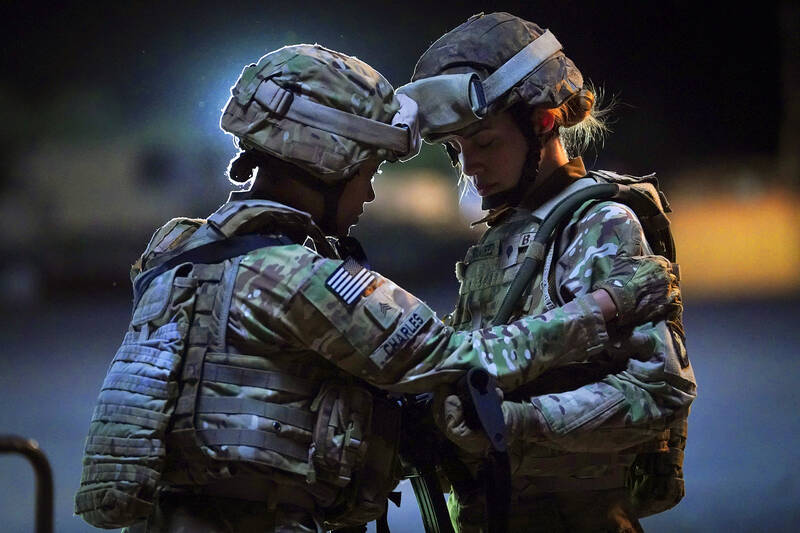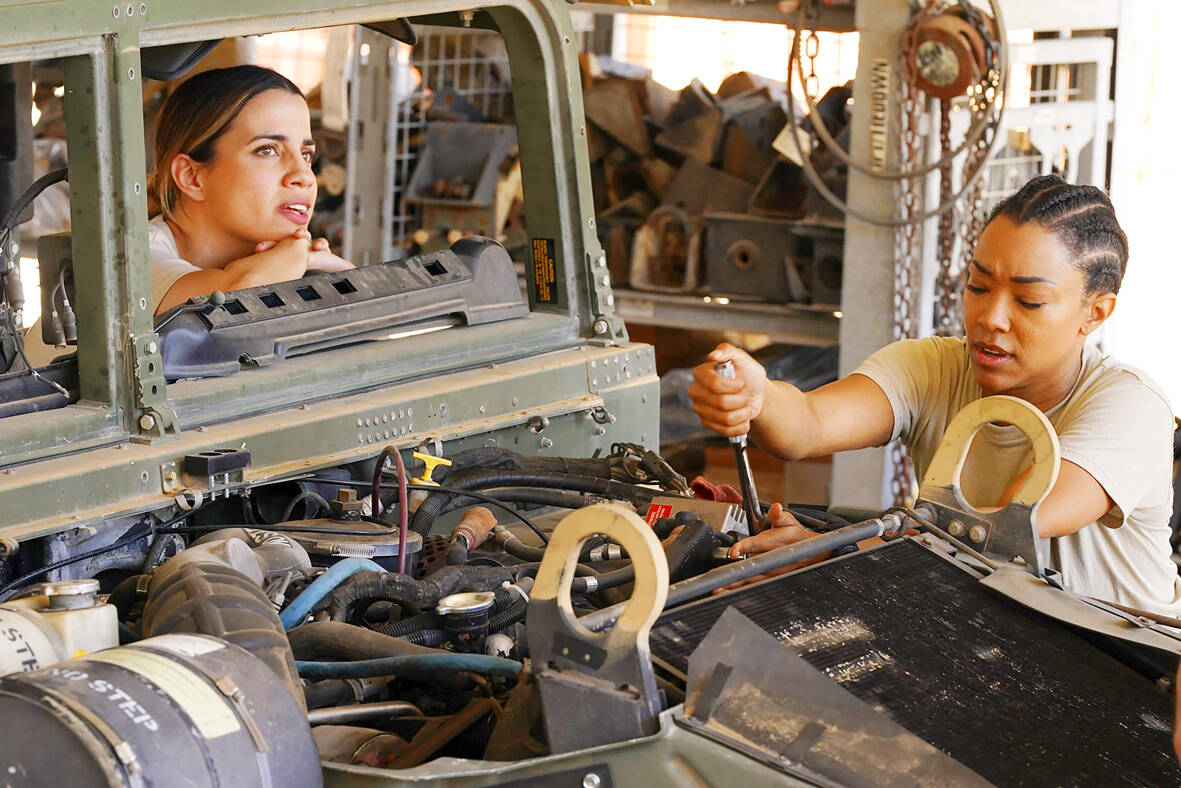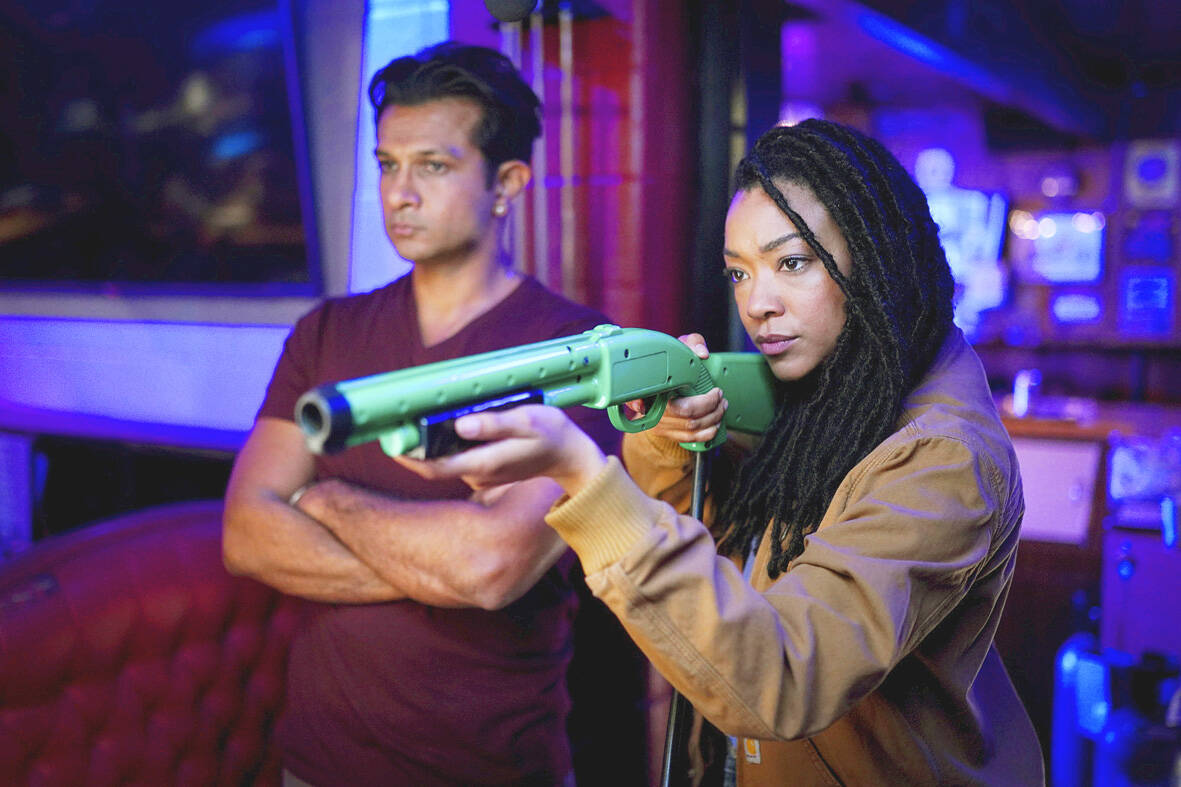Even for a film titled My Dead Friend Zoe, the opening scenes of Kyle Hausmann-Stoke’s movie have a startling rhythm.
First, two female American soldiers are riding in a Humvee in Afghanistan 2016 blasting Rihanna’s Umbrella. They are clearly friends, and more concerned with the music coming through loudly than enemy fire. Zoe (Natalie Morales) tells Merit (Sonequa Martin-Green) that if they ever set foot in “some dopy group therapy,” to please kill her.
Cut to years later, they’re sitting in a counseling meeting for veterans and Morales’ character has a sour look at her face. She turns to her friend: “Did we survive the dumbest war of all time just to sit here all broken and kumbaya and ouchie-my-feelings?”

Photo: AP
But after this rush of cavalier soldiering and bitter sarcasm comes a sobering moment. Merit blinks her eyes and is instead staring at an empty chair. Zoe isn’t there at all.
My Dead Friend Zoe, co-starring Morgan Freeman and Ed Harris, confronts a dark reality of post-combat struggle with as much humor and playfulness as it does trauma and sorrow. It comes from a real place, and you can tell. Hausmann-Stoke is himself a veteran and My Dead Friend Zoe is dedicated to a pair of his platoon mates who killed themselves. The opening titles note the film was “inspired by a true story.”
Audience disinterest has characterized many, though not all, of the films about the Iraq and Afghanistan wars, and the output has pretty much dried up over the years. My Dead Friend Zoe feels like it was made with an awareness of that trend and as a rebuke to it.

Photo: AP
This is an often breezy and funny movie for what, on paper, is a difficult and dark story. But the comic tone of My Dead Friend Zoe is, itself, a spirited rejection to not just the heaviness of many films about veterans but of the grief that can consume those who have dealt with loss and post-traumatic stress disorder.
Throughout the film, Zoe appears only to Merit, ala Brad Pitt in Fight Club, singing alongside her as she drives or impatiently waiting for Merit to come home from a run. Whether this, following some unspecified end to Zoe, is a healthy thing or not for Merit is increasingly in doubt. Merit needs to cling to her friend, or her memory of her. But Zoe also rolls her eyes at any suggestion of talking through her feelings. Zoe, as an apparition, is both the cause and relief to her pain.
There are a few other points of view, courtesy of two of our finest actors. Freeman plays the counselor of Merit’s mandatory group sessions. He refuses to let Zoe coast. To pressure her to share and participate, he threatens withholding Zoe’s certification.

Photo: AP
Meanwhile, Merit’s grandfather, Dale (Harris), a Vietnam vet, has just been diagnosed with early Alzheimer’s. Merit is tasked with keeping an eye on him at his rural lakeside cabin and helping him into a retirement community — a prospect that infuriates him. As Merit’s original inspiration for joining the army, Dale — stubborn and tight-lipped — epitomizes an earlier generation of soldier.
In toggling between the present and wartime flashbacks, My Dead Friend Zoe is sometimes a bumpy ride. The interplay between Merit and Zoe also shifts, beginning more like a buddy comedy and veering toward horror-film haunting, especially when Merit hesitantly agrees to a date with a worker at the prospective retirement home (Utkarsh Ambudkar).
But the movie’s earnestness carries it through these less smooth moments. So does the cast. Any opportunity to see Freeman or Harris, still at the top of their games, is a chance to be treasured. Freeman is typically sage and Harris characteristically fiery. But the leads are even better. Morales is at her finest as a cynical soldier, devoted to her friend but little else. And with compelling poise, Martin-Green (The Walking Dead) carries a movie that at times can feel scattershot but never not sincere.

Google unveiled an artificial intelligence tool Wednesday that its scientists said would help unravel the mysteries of the human genome — and could one day lead to new treatments for diseases. The deep learning model AlphaGenome was hailed by outside researchers as a “breakthrough” that would let scientists study and even simulate the roots of difficult-to-treat genetic diseases. While the first complete map of the human genome in 2003 “gave us the book of life, reading it remained a challenge,” Pushmeet Kohli, vice president of research at Google DeepMind, told journalists. “We have the text,” he said, which is a sequence of

On a harsh winter afternoon last month, 2,000 protesters marched and chanted slogans such as “CCP out” and “Korea for Koreans” in Seoul’s popular Gangnam District. Participants — mostly students — wore caps printed with the Chinese characters for “exterminate communism” (滅共) and held banners reading “Heaven will destroy the Chinese Communist Party” (天滅中共). During the march, Park Jun-young, the leader of the protest organizer “Free University,” a conservative youth movement, who was on a hunger strike, collapsed after delivering a speech in sub-zero temperatures and was later hospitalized. Several protesters shaved their heads at the end of the demonstration. A

Every now and then, even hardcore hikers like to sleep in, leave the heavy gear at home and just enjoy a relaxed half-day stroll in the mountains: no cold, no steep uphills, no pressure to walk a certain distance in a day. In the winter, the mild climate and lower elevations of the forests in Taiwan’s far south offer a number of easy escapes like this. A prime example is the river above Mudan Reservoir (牡丹水庫): with shallow water, gentle current, abundant wildlife and a complete lack of tourists, this walk is accessible to nearly everyone but still feels quite remote.

In August of 1949 American journalist Darrell Berrigan toured occupied Formosa and on Aug. 13 published “Should We Grab Formosa?” in the Saturday Evening Post. Berrigan, cataloguing the numerous horrors of corruption and looting the occupying Republic of China (ROC) was inflicting on the locals, advocated outright annexation of Taiwan by the US. He contended the islanders would welcome that. Berrigan also observed that the islanders were planning another revolt, and wrote of their “island nationalism.” The US position on Taiwan was well known there, and islanders, he said, had told him of US official statements that Taiwan had not